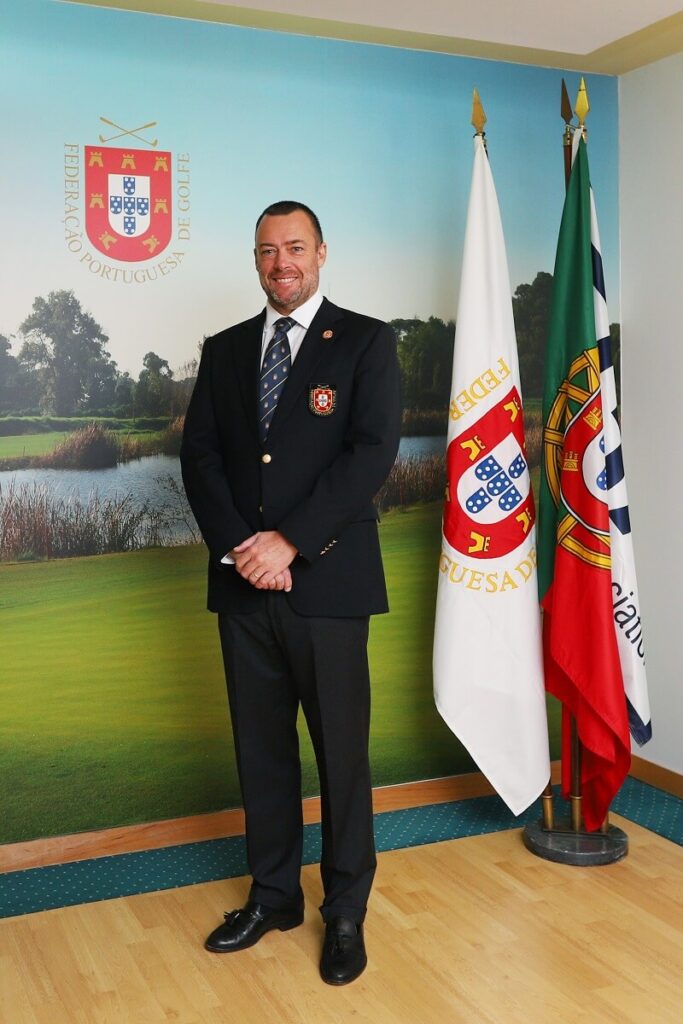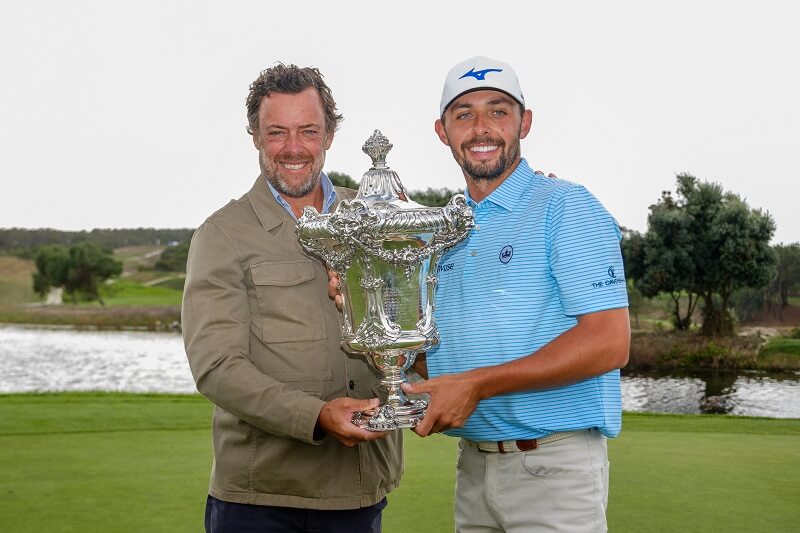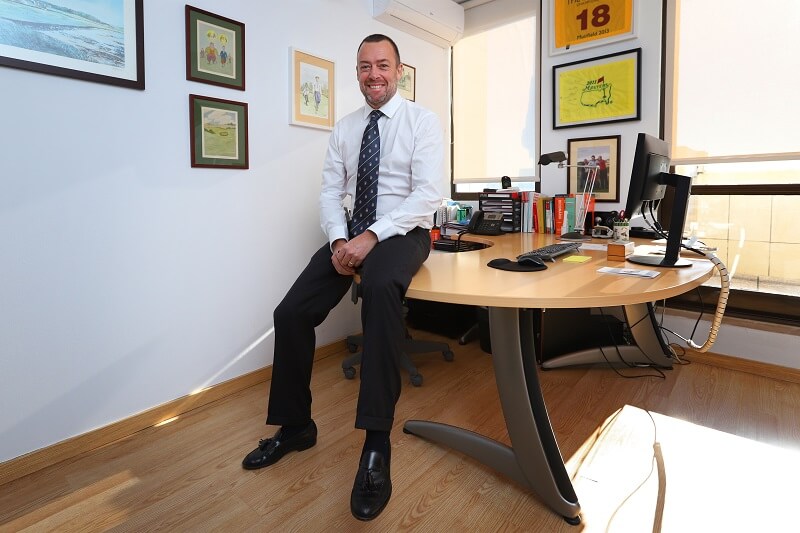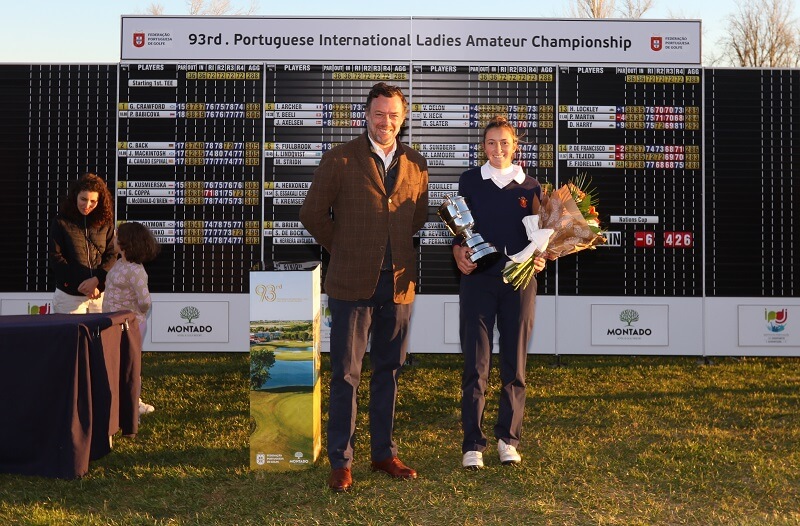Elevating the game: Miguel Franco de Sousa has been president of the Portuguese Golf Federation since 2016
– February 14, 2024 | Text Maria Simiris | Photos Courtesy of FPG

Miguel Franco de Sousa first ventured into the world of golf when he was just 10 years old, in 1984, the same year the Quinta da Marinha course in Cascais was inaugurated. At the time, he lived in Sousel, in the Alentejo, in an area with few facilities to play golf, which led him to get creative and make his own driving range, he recalls.
In 1994, he moved to Palm Desert, California, USA, where he studied Golf Course Management and Design. “I knew early on that I wanted to be involved in this sport, whether as a player, which seemed unlikely, or working in course management,” he explains. In 1996, he began his professional career at the Belas Clube de Campo, near Lisbon, where he witnessed the course’s construction and inauguration, and, in 2003, he was involved in overseeing the Beijing 2008 Project, which aimed to prepare athletes for the Olympic Games, during which time he had “the honour of captaining the National Team in dozens of international competitions, including World and European Championships at various levels”.
In 2010, he was invited to take on the role of secretary general of the Portuguese Golf Federation (FPG), a position he held until his bid for president. After various international roles, including member of the European Golf Association’s Championship Committee (2010-2013) and captain of the Continental European team in the Jacques Léglise Trophy (2013, 2014 and 2015), he has been president of the FPG since 2016.
Describing the current golfing scene in Portugal, 49-year-old Miguel Franco de Sousa says there are two realities that are “totally different” – there is golf as a sport and golf as a tourism segment. The latter “recorded an absolutely extraordinary performance in the post-pandemic period, showing enormous resilience and promoting the message that golf is an inclusive, fun and social sport,” he points out. In 2022, there was a 10.5% growth, with the federation registering more than 17,000 members for the first time. In 2023, there was a 3.2% increase – “we are convinced that we can reach 18,000 athletes”, says the president.
Another factor he believes has contributed to these figures is Portugal’s ‘9 & ½ Week Programme to Attract New Golfers’, an initiative that has already organised more than 800 golf training courses, with more than 65% of participants becoming members of clubs and the federation. “We can say that golf is experiencing a good moment, but it’s important not to get complacent. We have to keep the lines of communication open and work closely with national golf clubs and courses,” he says.

For Miguel Franco de Sousa, one of the most important milestones since he became president was resuming “the organisation of the Open de Portugal, an event that has helped to promote the country as a golfing destination and to generate playing opportunities for Portuguese professional athletes”, he says.
And one of the FPG’s main goals is to support these athletes, both amateurs and professionals. “We have golfers from U14 up to the top level who compete regularly on the FPG’s competitive programmes and abroad with the National Teams. They benefit from technical, physical, psychological and nutritional support, in an environment that is conductive to high performance,” he states.
As for the golf scene in the Algarve, the president believes that there are new players “with a strategic vision for establishing the Algarve as a high-quality destination”. In this sense, “it’s natural for opportunities to arise in terms of organising major golf events. We have fought to reinforce investment by public organisations in this direction and we will continue to do so”, he assures.

For Franco de Sousa, water usage on golf courses is another topic that needs addressing. “It’s an issue that is on the FPG’s agenda, and we believe that very important steps are being taken, such as the reuse of treated wastewater in irrigation. There are currently two courses being irrigated with treated wastewater, and there is a plan for more than 50% of the courses to be irrigated through water reuse,” he predicts. Still on this topic, he believes “there is a massive ideological bias behind the criticism of golf and an unacceptable lack of responsibility when attacking an industry that is so important for the Algarve and the country”.
As for the Federation’s plans and ambitions for the future, Franco de Sousa laments “a clear lack of strategy for promoting Portugal as a golf destination, particularly in the Algarve, especially in terms of major international events. There are a number of destinations competing with the region and which are investing significantly in establishing themselves as leading [golf] destinations”. He also criticises Portugal’s tourism board for “under-investing” in events, having supported the Open de Portugal in 2023 “with just €30,000, compared to €100,000 in previous years. What’s more, for the first time in dozens of years, there was no DP World Tour tournament,” he says.

Franco de Sousa also voiced his disappointment with the government’s decision to remove the Portugal Masters from the 2023 calendar: “We think this is an irresponsible decision. In a sector that contributes so much to the economy and to local communities, particularly where golf tourism has a more significant impact, it’s incomprehensible that Portugal is going in the opposite direction of its main competitors, such as Spain, right next door, which is hosting dozens of major professional competitions, including an LIV Golf event, the Solheim Cup, and two DP World Tour events. We have a highly qualified sports circuit, the quality of which is recognised by everyone, but we could soon be forgotten if we don’t invest in promoting it,” he warns.
In his opinion, the way to improve the future of golf in Portugal is to enhance cooperation between the private and public sectors. “Leading players in the industry need to work together with the government and local authorities. The FPG will be calling on public entities to invest in major golf events, combined with a national strategy for developing the sport. This will indeed contribute to the growth of golf in Portugal,” Miguel Franco de Sousa assures.










